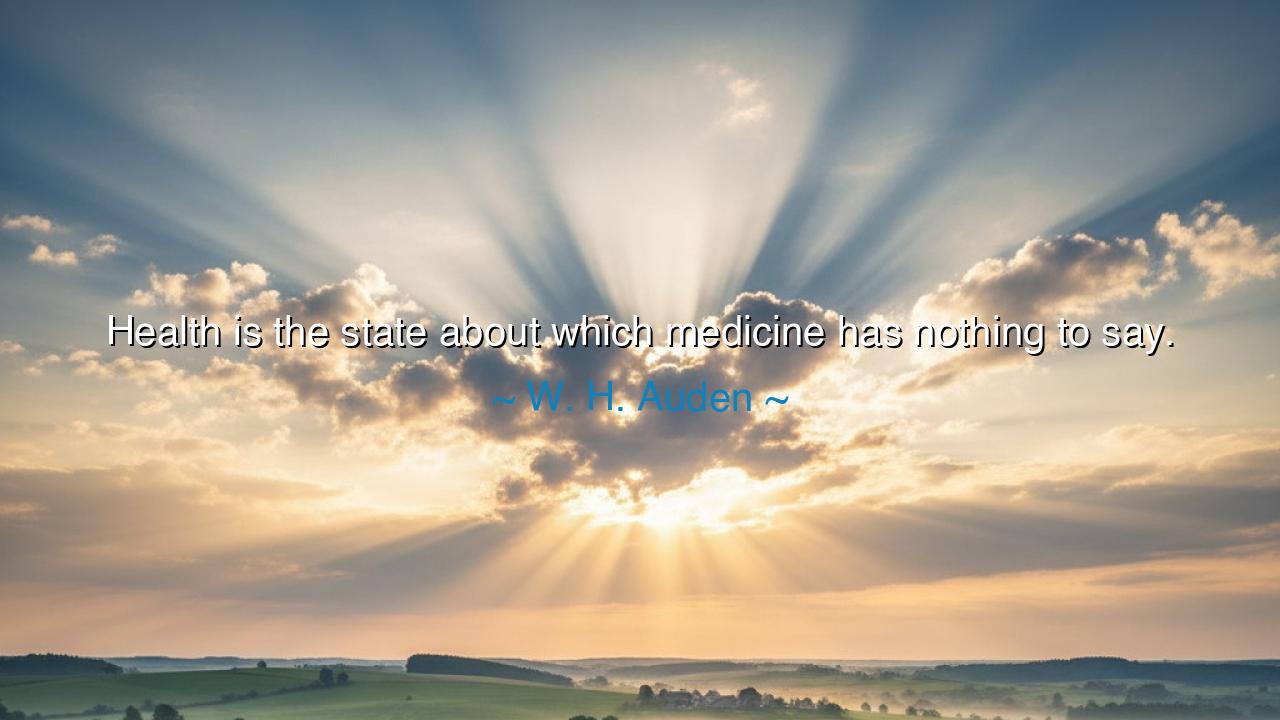
Health is the state about which medicine has nothing to say.






“Health is the state about which medicine has nothing to say.” — W. H. Auden
Hear now the wisdom of W. H. Auden, poet of the soul and chronicler of the human condition, who in this brief yet profound saying reveals the silent triumph of true health. He reminds us that health is not the domain of doctors, nor the product of hospitals or medicines. It is a state so complete, so harmonious, that medicine itself falls silent before it. For medicine speaks only when the body is broken, when imbalance and suffering cry out for remedy. But health — that serene and untroubled balance of body, mind, and spirit — is beyond the need for words, beyond the reach of intervention. It is the condition of wholeness, the song of the body when all its instruments are in tune.
Auden, a man of both intellect and introspection, lived through the age of war and mechanization, when human beings began to treat even their own bodies as machines to be repaired. His origin of thought came from observing how modern civilization, though advanced in medicine, had forgotten the art of living well. He saw that while doctors could treat disease, they could not create health. They could quiet pain, but not nurture peace. Thus, he spoke this paradox: that the greatest success of medicine is to make itself unnecessary, and the highest form of health is that which needs no physician.
In this, Auden echoes the wisdom of the ancients. The philosophers of Greece taught that health was not merely the absence of illness but the harmony of being — a unity between body, soul, and world. Hippocrates himself, the father of medicine, said that nature is the true healer, and the physician only its humble servant. The sages of the East, too, understood this truth: in the teachings of Ayurveda and Tao, the body is a universe, and to be healthy is to live in rhythm with the great laws of nature. When the heart is tranquil, the breath steady, and the mind compassionate, health reigns, and medicine has no work to do.
Consider the story of Mahatma Gandhi, whose frail body was sustained not by medicine, but by discipline and faith. Though he lived through imprisonment, fasting, and hardship, he found strength in balance — in purity of diet, simplicity of life, and mastery of desire. He believed that health was the fruit of self-control and harmony, not indulgence or fear. When asked why he rarely sought doctors, he replied that the body is wiser than we think, and that listening to it is the first medicine. Gandhi’s life stands as a living echo of Auden’s insight: true health is not bought, but cultivated — a quiet state of order that leaves nothing for medicine to mend.
The poet’s words also remind us of the limits of science, for medicine, though powerful, can only touch the surface of human well-being. It can repair a broken bone, but not a broken spirit; it can calm the heart, but not teach it joy. The physician may guide the body toward recovery, but health itself arises from the mysterious interplay of love, peace, nourishment, rest, and purpose. Auden teaches that the greatest physician is life itself — the air we breathe, the food that grows from the earth, the laughter that lightens the soul, and the kindness that binds human hearts.
And yet, these words are not a rejection of medicine, but a call to balance. For medicine has its rightful place — noble and necessary in times of sickness — but health begins long before illness, in the quiet choices of daily living. It grows in gratitude, in moderation, in connection to nature and to others. It is the art of living gently yet fully, of giving the body care and the mind rest. When we live thus, medicine becomes silent because it has no quarrel with us; the body becomes its own healer, and the spirit its own physician.
Let this, then, be the lesson carried forward: do not live only to escape disease, but to cultivate wholeness. Seek not only cures, but balance — the peace that comes from aligning your life with what nourishes rather than harms. Wake with the sun, move with intention, eat with mindfulness, love without measure, and rest without guilt. For in such living, you will find the state Auden speaks of — the quiet kingdom where medicine has nothing to say, and the body, mind, and spirit sing together in wordless harmony.
And remember, O listener of truth: the finest victory of medicine is not the conquest of death, but the creation of lives so healthy, so radiant, that death itself loses its sting. When you live in harmony, you become the physician of your own being — and your life, in its strength and serenity, becomes the poem that W. H. Auden sought to write: a hymn to the beauty of being whole.






AAdministratorAdministrator
Welcome, honored guests. Please leave a comment, we will respond soon